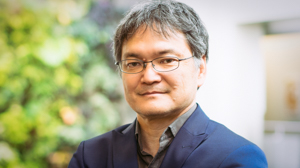- Future Students
- Current Students
- Faculty
- Staff
- Alumni
- Others
Exploring UofGH research into existential distress

UofGH alumna Vanessa Martin
A chance to be involved in a research project on existential distress at the University of Guelph-Humber allowed recent graduate Vanessa Martin to acquire several new skills such as critical thinking, writing and the ability to read qualitative data.
Martin graduated last year from the Psychology program at UofGH and started working as a research assistant to Psychology instructor Dr. Chris Lo, whom she met in her fourth year, as part of the Research at UofGH (How to get undergraduate research experience) initiative.
The experience proved invaluable.
Martin recently won one of four Research Merit Awards for her poster on how to have existential conversations with patients coping with severe illness at the International Conference for Applied Psychology in Toronto. The UofGH alumna impressed the judges with her ability to distil large amounts of interview data into a visually appealing form for the audience’s consumption.
Why opt for research?
The term “existential” refers to issues of meaning and value in life. The purpose of this research is to help people who have been diagnosed with a life-limiting illness to talk about the significance of their lives as they cope with the prospect of disability or as they contemplate their mortality.
“For the research poster, I came up with traffic symbols to represent the different strategies that patients would use to approach or avoid important existential questions and concerns raised by their illness,” Martin explained. “I have gained enormous skillsets as part of my work with Dr. Lo. I interact and interview the patients as well as the doctors to get their perspective (on existential distress) and put my analytical skills to work by analyzing all the qualitative data.”
Dr. Lo’s study “Psychological Study of Existential Distress in Patients with Life-threatening Disease” examines how patients diagnosed with terminal as well as chronic illnesses such as cancer or pulmonary arterial hypertension, a disease of the lung, deal with the repercussions of illness on close relationships, the sense of personal identity, and the future. In the case of those with advanced cancer, the study delves into how people can prepare for the end-of-life and seek a sense of life completion and closure.
The idea behind the research
As part of the study, Dr. Lo and his research assistants interview people coping with a life-threatening or life-limiting illness and ask them to share their experiences of disease and how it has come to impact the quality and meaning of their lives.
Through his research, Dr. Lo hopes to develop psychological interventions for clinicians tasked with alleviating distress and promoting adaptation to this situation.
“I have been looking at how patients will approach or avoid some of the harder subjects,” Martin said. “So, I took all the avoidance responses (of the patients) from 30 interviews and categorized them into four different strategies which is really helpful because when clinicians are having these difficult conversations, they can learn to recognize when the patient is not coping as well as they say they are.”
“With good supportive care, it’s possible to help individuals to make sense out of the trauma of disease and to think about what is most important to them, so that they can make the most of the time that they have,” Dr. Lo explained, adding his research also looks at assisting both individuals and their families.
People with pulmonary hypertension can live with the condition for years and yet they are at risk of sudden death as well. Given that patients have to reckon with the two extremes, Dr. Lo’s research team has been examining how these individuals manage this uncertainty to live in meaningful ways.







